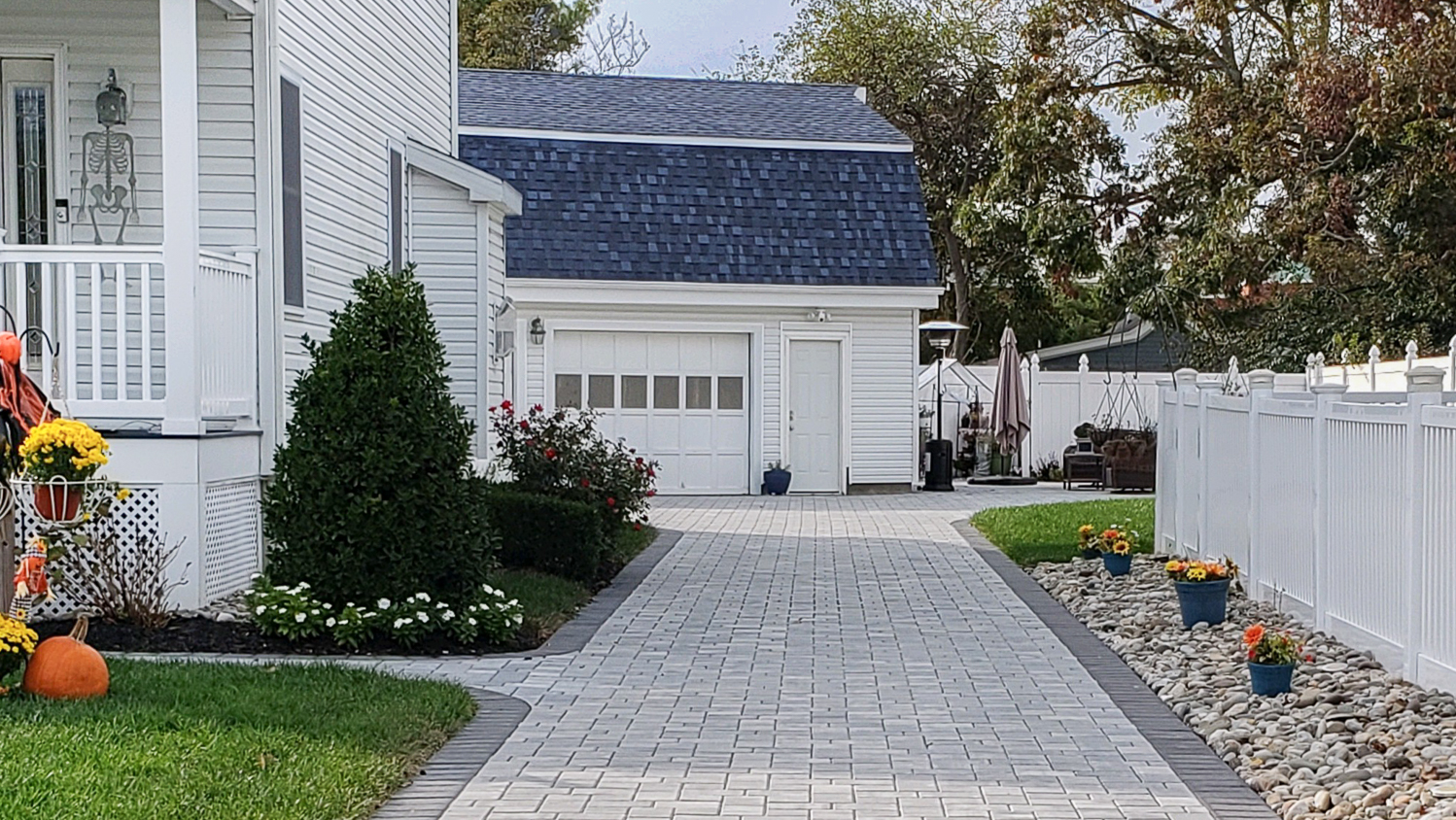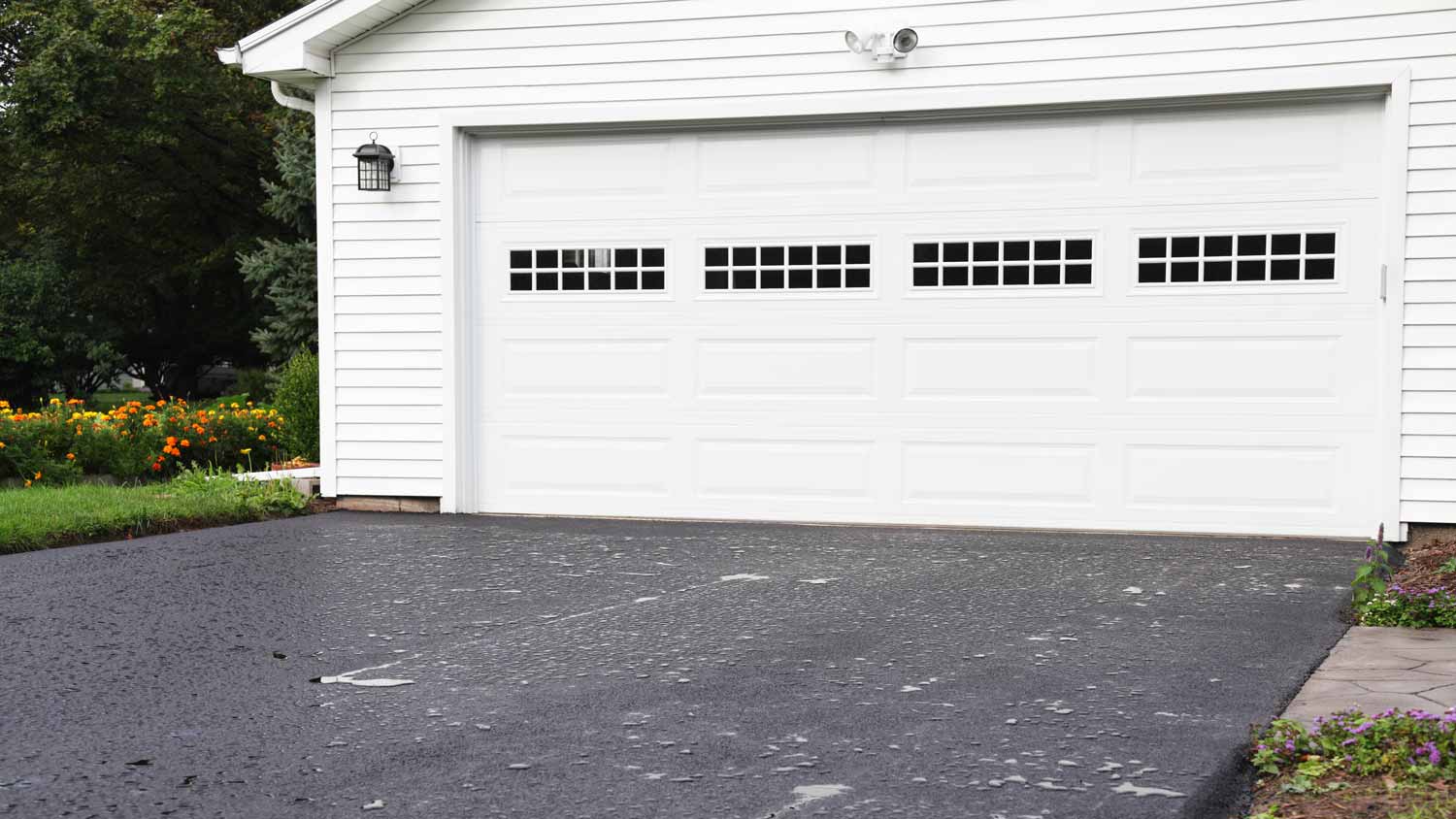
Discover the average paver driveway cost, including price ranges, key cost factors, and tips to help you budget for your driveway project.
Oil and driveways don’t mix


Hiring a pro to pressure wash a driveway costs between $60 and $130 per hour, but they have commercial-grade degreasers that remove caked-on oil stains.
DIYers may accidentally damage their asphalt or etch their concrete driveway.
A pro will prep and protect the area, including plants, edging, and nearby surfaces that may be harmed by runoff chemicals.
A power washing pro can evaluate whether the oil stain signals a bigger problem, like driveway surface deterioration or sealant failure, and recommend a fix.
Oil from gas appliances, transmission fluid, and your car’s engine can all turn your pristine driveway into a splotchy mess. Thankfully, removing oil stains from driveways can be as simple as opening up your pantry and following a few quick steps. Follow these steps to remove oil stains from your driveway DIY-style.
Oil stains don’t just present an eyesore every time you pull up to your home—leaving stains on your driveway can slowly erode your driveway material, leading to high driveway repair costs. It’s best to tackle oil stains immediately to prevent your driveway from crumbling or cracking and needing driveway repairs before its natural time.
If you choose to use a driveway oil stain remover and DIY it, you’ll only spend between $10 and $20 for the stain remover supplies. Depending on the size of the oil stain, your purchase should last several cleans. Pressure washing costs an additional $100 to $350 on average. If you hire a professional to clean your driveway, most pros charge between $60 and $125 per hour.
Before you take on removing oil stains, you’ll first need to prepare your driveway to get the most out of the cleaning process. We’ve rounded up several tips on prepping to remove oil stains.
Depending on your type of driveway material, some oil stain removers work better than others, while others shouldn’t be used on certain surfaces. Asphalt and concrete driveways have different compositions, so using the wrong stain remover could cause damage to your driveway. For example, asphalt is oil-based—a solvent stain remover can eat away at the surface.
Always refer to the instructions on a driveway oil stain remover to ensure you have the right product for the job.
You’ll want to clear the area beforehand, so park your vehicles on the curb and move any items from your driveway. Then, use a broom to remove dirt, leaves, and debris. This will make it easier to clean the surface effectively.
If you have a large oil stain or stains close to the edges of your driveway, you might want to protect any surrounding plants or decorations from harsh chemicals. You can do so by watering grass, trees, and gardens to saturate the ground and dilute any cleaning agents that happen to reach them.
You have several options for removing oil stains from your driveway. Some solutions might already be lying around the house, while others require a little more investment.
Pressure washers can help clean oil stains off driveways while also giving your driveway a cleaning. Here’s how to use a pressure washer to clean your driveway:
Consider adding detergent before operating the washer.
Wear safety goggles, gloves, and ear protection.
Stand 10 feet away from the oil stain.
Spray the cleaner onto the stain in a bottom-to-top manner.
Like a grease-ridden dish, dish soap can work to remove oil stains from driveways. To use dish soap, follow these steps:
Apply a few drops of dish soap to the stain.
Put on gloves to protect your hands.
Scrub the stain using a stiff brush.
Use warm water to rinse the soap away.
Repeat if needed.
Baking soda is a mild abrasive that, in paste form, can help to remove oil stains from hard surfaces. Because baking soda is alkaline, it also breaks down oil stains better than pH-neutral solutions. Here’s how to clean oil off a driveway using this strategy:
Apply baking soda to the oil spill.
Add warm water to make a paste.
Wear gloves to protect your hands.
Use a stiff brush to scrub the stain for several minutes.
Wait at least 15 minutes.
Follow with white vinegar.
Rinse the baking soda and vinegar solution using water.
Repeat if necessary.
Powdered laundry detergent is another good option because it’s abrasive yet gentle on surfaces. You’ll want to use powdered detergent to create a paste, which you’ll use to scrub the oil away. Follow these steps to try it out:
Sprinkle your powdered laundry detergent on top of the oil spill.
Add warm water until the detergent becomes a paste.
Put on gloves to protect your hands.
Use a stiff brush to scrub the stain for several minutes.
Wait at least 15 minutes.
Rinse the detergent away using warm water.
Repeat if necessary.
WD-40 is a versatile solution that helps remove oil stains from concrete driveways. To use WD-40 as a driveway stain remover, do the following:
Shake your can of WD-40.
Spray the WD-40 onto the oil stain.
Let it sit for at least 15 minutes.
Wear gloves to protect your hands.
Scrub using a stiff brush.
Use baking soda or cat litter to absorb the solution (optional).
Rinse the area using water.
Repeat as needed.
Cat litter won’t do much for old oil stains, so go straight to oil stain removers if it’s already dry. But, if your oil stain is fresh, you might be able to use cat litter to absorb the oil. Here’s how:
Pour cat litter over the stain until the stain is no longer visible.
Let the litter sit for at least 30 minutes.
Use a broom and dustpan to sweep the litter up.
Wear gloves to protect your hands.
Scrub the stain using a stiff brush and laundry or dish detergent.
Rinse the area with water.
Repeat as needed.
For stubborn oil stains, you might need to switch to a stronger solution. Concrete driveways can handle tough solvents that break down oil stains. If you need to remove oil stains from an asphalt driveway, use a degreaser designed for asphalt. With this in mind, here’s how to use a concrete oil stain remover:
Wearing gloves, apply the stain remover to the stain.
Let the product sit according to the manufacturer’s instructions.
Use a stiff brush and dustpan to sweep up the product.
Spray the area with water.
Repeat as necessary.
Removing oil stains from a driveway can be a mild inconvenience, but staying on top of your driveway maintenance can help you prevent oil stains from seeping into your driveway and becoming harder to remove. Here are some tips on how to prevent driveway oil stains from taking over your driveway:
Seal your driveway every five to seven years if it’s concrete and every three to five years if it’s asphalt to prevent stains from sinking deep into the surface material.
Take your car in for scheduled maintenance.
Fix leaks from your car as soon as problems arise.
If you must wait before fixing your vehicle, place a piece of cardboard underneath the leak to keep it from reaching your driveway.
Clean your driveway once yearly.
Sprinkle cat litter onto fresh oil leaks before they have a chance to enter your driveway surface.
Most driveway oil stains are easy to remove using household products and a little elbow grease. However, if you have deep stains that don’t come out after following these at-home steps, hire a local power-washing pro to remove the stains and get your driveway looking spotless again.
I hired DNA Gates and Fences through HomeAdvisor for a driveway security gate installation at my business, and the entire experience was excellent. The team was professional, courteous, and highly skilled. They took the time to understand my security needs and recommended the best materials...
They were really respectful, they did the work fast, and cleaned everything and I did not even had to ask, I recommend them
Jiovany and his team were so great from the start, at communicating then at the job, fast and dedicated. Didn’t leave until we were happy with every detail. They went far and beyond to make the place spotless and pristine. Reliable, responsible and respectful.
First contacts with this company for 2 bathroom remodel projects. The professionalism, clear communication of what to expect, follow-up --- very excellent! Looking forward to continuing this project.
AJ was immensely responsive, professional, and easy to work with. Would wholly recommend to anyone in need of electrical work!
Excellent Roofing Service. Highly Recommend! Customer service is amazing. Throughout the project, Angel Chakour kept me informed with regular updates and was always available to answer any questions. His friendly and approachable attitude made the entire process much more enjoyable. It is...
I contacted the chimney guys last week for an inspection and cleaning service, everything is done and thank goodness they came because they removed a lot of dirt and they told me that the person who came for maintenance last year had done nothing! So now you have my trust.
I had a massive three bedroom house to pack up and move across the state This moving company had my back though Their customer service was top notch They kept me in the loop throughout the whole process Plus they were bang on schedule All my belongings made it in one piece Kudos to these...
It has been a while since we wanted to write a review. We recently sold our house, and we believe that the remodel helped to increase its value. Aviv managed our project, and he was always available to answer our questions and address our concerns. The project was extensive, involving opening...
Roman is a breath of fresh air. He comes into your home and get everything that you need done. I highly recommend him.
From average costs to expert advice, get all the answers you need to get your job done.

Discover the average paver driveway cost, including price ranges, key cost factors, and tips to help you budget for your driveway project.

Asphalt driveway repair costs account for everything from hairline cracks to complete overhauls. Learn what to expect from your asphalt repair bill.

Calculate the cost of installing a new asphalt driveway based on dimensions, depth, finishes, and other custom driveway details.

Adding a new asphalt driveway to your home can boost its overall appearance and give homeowners a nice ROI down the line. But how long do asphalt driveways last, and what can you do to maximize their lifespans? Read this guide to find out.

Don’t let damaged asphalt ruin your driveway. Follow this step-by-step guide for everything you need to know about cutting asphalt the right way.

Wondering when your new driveway can handle water? Learn the right wait time for asphalt and concrete so you can prevent cracks and early wear and tear.